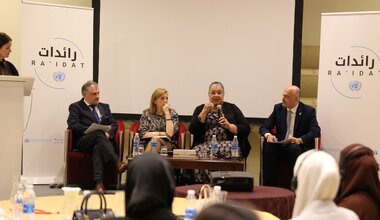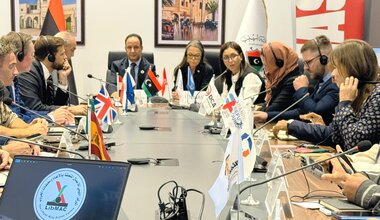Human Rights Report on Civilian Casualties - December 2016
Tunis – From 1 December to 31 December 2016, the United Nations Support Mission in Libya (UNSMIL) documented 10 civilian casualties, including 3 deaths and 7 injured, during the conduct of hostilities across Libya. Victims included 1 child injured, 3 men killed and 1 injured, 1 woman injured, and the sex of the other 4 was not recorded.
Civilian Casualties and Facilities
The 3 civilian deaths and injury to 1 person were caused by gunshots. 5 others were injured by improvised explosive devises, and 1 injured in an airstrike. 2 deaths occurred in Tripoli and one in Sabha, while the majority of those injured were in Benghazi (6 injured), followed by Mizda (1 injured).
The civilian casualties included the following cases. On 1 December, two improvised explosive devises exploded in the Benghazi Medical Centre, injuring one medical worker and causing damage to the building. On 21 December, another two improvised explosive devises exploded, injuring 4 people and also causing damage to the building.
On 5 December, armed men opened fire in front of the Poly-Technical Institute of Mizda, injuring the Director of the Institute. On 16 December, a boy was injured during airstrikes in Ganfouda, Benghazi.
On 25 December, the bodies of two policemen from the Criminal Investigation Department of the Ministry of Interior were found in Tripoli with gunshot wounds. They reportedly disappeared on 23 December. In 28 December, armed men shot dead a man in Sabha, while reportedly trying to steal his car.
No-one claimed responsibility for the attacks and UNSMIL was unable to determine with certainty which parties to the conflict caused the civilian casualties in December.
Other Casualties
On 6 December, the body of a young man was found in Kufra with gunshot wounds. He had reportedly been abducted on 1 December by an unidentified armed group.
On 8 December, the bodies of two male detainees from the “al-Rwiemi” prison were found in Ain Zara, Tripoli, not far from the prison. The bodies had gunshot wounds to the head, chest and stomach. Family members have requested prosecution authorities to open an investigation.
In December, the bodies of migrants continued to wash up on beaches. Reportedly, on 5 December, 5 bodies were found near Tajoura, while in late December, 11 bodies were found on beaches in Tripoli.
On 28 December, the bodies of two men were found in Sabha, one in a rubbish dump and one on the street.
Note
The figures for civilian casualties set out above only include persons killed or injured in the course of hostilities and who were not directly participating in the hostilities. The figures do not include those casualties that are not a direct result of hostilities, for example executions after capture, torture or abductions, or casualties caused as an indirect consequence of hostilities. The figures are based on information UNSMIL has gathered and cross-checked from a broad range of sources in Libya, including human rights defenders, civil society, current and former officials, employees of local governments, community leaders and members, witnesses, others directly affected and media reports. In order to assess the credibility of information obtained, where possible, UNSMIL reviewed documentary information, including medical records, forensic reports and photographic evidence.
The figures are only those that UNSMIL was able to document in the reporting period. They are not likely to be complete and may change as new information emerges about incidents involving civilian casualties that took place during this period.
Similarly, while UNSMIL has systematically tried to ensure that the cases it documented are based on credible information, further verification would be required to attain a higher standard of proof. Due to the security situation, UNSMIL has not been able to carry out direct site visits in Libya to obtain information. Disruption in communications especially in areas controlled by groups pledging allegiance to ISIL and fear of reprisals against sources further hamper information gathering.
While not all actions leading to civilian casualties breach international humanitarian law, UNSMIL reminds all parties to the conflict that they are under an obligation to target only military objectives. Direct attacks on civilians as well as indiscriminate attacks – which do not distinguish between civilians and fighters – are prohibited. Attacks that are expected to cause incidental loss of civilian life, injury to civilians and damage to civilian objects excessive to the anticipated concrete and direct military advantage are also prohibited. Such attacks amount to war crimes that can be prosecuted by the International Criminal Court.
In order to ensure greater protection of the civilian population and essential infrastructure, all parties engaged in fighting in Libya must cease the use of mortars and other indirect weapons and imprecise aerial bombardments in civilian-populated areas, and not place fighters or other military objectives in populated areas. All executions of captives must cease and all those captured including fighters must be treated humanely in all circumstances. Murdering or torturing captives is also a war crime, regardless of what the captive may be accused of.
 United Nations Peacekeeping
United Nations Peacekeeping UN
UN









